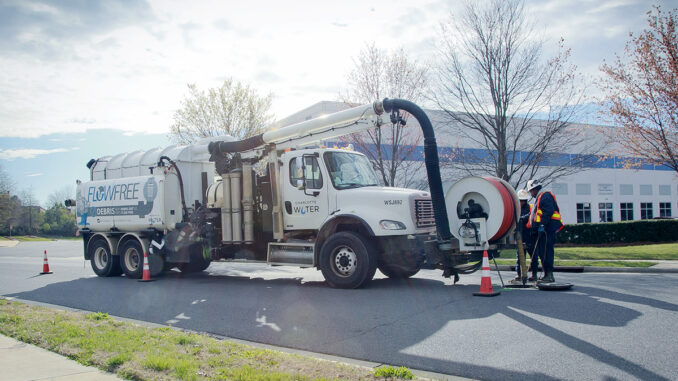
RALEIGH — The city of Charlotte scored a major financial win as the state’s Local Government Commission approved more than $1.1 billion in financing to bolster the region’s water and sewer infrastructure at its June 4 meeting.
Charlotte Water provides roughly 116 million gallons of water and treats 85 million gallons of wastewater daily across Mecklenburg County and its 1 million customer accounts.
Charlotte received approval for a two-part, nine-figure financing package. The larger portion is $610 million in revenue bonds that will be issued to pay off previous debt incurred through a bond anticipation note (BAN) for water and sewer infrastructure improvements and additions. A BAN is a type of short-term borrowing that municipalities use when they expect to issue long-term bonds for a project in the future.
The smaller portion was a separate request for $500 million in new BAN financing for additional water and sewer infrastructure projects in the Charlotte metro area.
To cover the mounting costs, the utility is anticipating annual water and sewer rate increases of 5.75% from fiscal years 2025 through 2029. Water accounts are expected to rise by 1.9% in 2025, while sewer accounts will likely see a 1.8% increase.
Charlotte wasn’t the only local government getting a green light for large financing requests:
• $28 million each will go to the Asheville Housing Authority and Durham Housing Authority for new multifamily housing developments targeting lower-income households.
• $23.5 million for the Orange Water and Sewer Authority to extend and improve sewer and water infrastructure, reimburse capital project funds and refund older bonds at a savings of $290,169.
• $17 million for Pitt County to construct a new welding building at Pitt Community College, allowing an expansion to nearly double student enrollment in that program.
• $16.5 million for the Town of Chapel Hill to continue construction of a downtown parking deck on Rosemary Street, acquire a ladder truck and furnish the town’s new police station.
• $13 million for Orange County for vehicles, school maintenance and stormwater projects.
• $12.5 million for the City of Concord to build, equip and furnish a new fire station and police substation at the city’s airport.
• $10 million for Shelby to finance rehabilitation of the 100-unit Laurel Hill Apartments multifamily housing development.
Additional approvals included a $7.3 million loan for sewer work in Winterville, $6 million for electric system upgrades in Clayton, $4.1 million for water/sewer funding in Jacksonville, and a $2.2 million purchase and renovation agreement in New Bern for a new electric operations building.
The LGC also signed off on smaller financing packages, such as $598,650 for Asheville to inspect water lines and create an inventory for future lead service line replacements, a $574,614 State Revolving Fund loan for Wallace to inspect and repair aging sewer lines and rehabilitate 52 manholes, $465,000 to the town of Star to fund long-term supply water and sewer services plans, and $233,085 for the City of Brevard to finish demolition and replacement of a 1 million-gallon water tank.
Rocky Mount’s request to approve debt to construct a new fire station received significant discussion, after which the commission voted to revisit the issue at its July meeting.
LGC members also approved a resolution to return financial control of the Town of Kingstown effective July 1. The LGC had assumed control of Kingstown’s finances back in December 2020 after the Cleveland County town was found to have violated the Local Government Budget and Fiscal Control Act and had missed deadlines on mandatory audits.
Additionally, it was disclosed that around 98 local government units may be subject to LGC action for failing to submit required audits. Of the late audits, 18 units notified the LGC that they plan to submit by June 30.
Near the end of the meeting, North Carolina Treasurer’s Office Financial Analyst Frank Bowen warned that the N.C. Department of Transportation’s (NCDOT) trend of fiscal health may be ending.
“My fear is we’ve got two things moving in the opposite directions,” Bowen said in response to N.C. Treasurer Dale Folwell asking what his fears were related to the NCDOT finances.
Using a comparison of NCDOT’s combined cash balance and the agency’s open commitments, Bowen said the NCDOT’s cash balances are projected to decline in 2025 and 2026 while open commitments have increased since 2021 and stand at $8.2 billion. That figure does not include a May 2024 project commitment running upward of $1.145 billion.
“By their own projections, we’re getting into what historically could be a danger zone, for lack of a better term,” Bowen said.
Bowen also said the Highway Trust Fund (HTF) has declined 25% since June 2023.
The NCDOT has struggled with its spending over the last six years.
In 2019, NCDOT overspent its budget by $1.8 billion, draining $1.1 billion from the HTF without proper approval and leading to the suspension of 900 projects.
NCDOT Secretary Jim Trogdon abruptly resigned on Feb. 4, 2020. Gov. Roy Cooper named Eric Boyette to fill the role. In September 2023, Cooper replaced the retiring Boyette with Joseph R. “Joey” Hopkins, who was the NCDOT chief operating officer at that time.
Four months after Trogdon resigned, NCDOT officials were called before lawmakers in a hearing over the agency’s financial issues. That followed an earlier hearing in May over a state audit showing NCDOT overspending of $742 million.
Things came to a head in summer 2020, with Folwell calling for the replacement of the department’s chief operating and financial officers.
The NCDOT looked to be on the right track when it received praise from Folwell in January 2023 after the agency repaid an HTF loan early. Similarly, that May, a state audit showed the NCDOT’s finances were on the right track.


